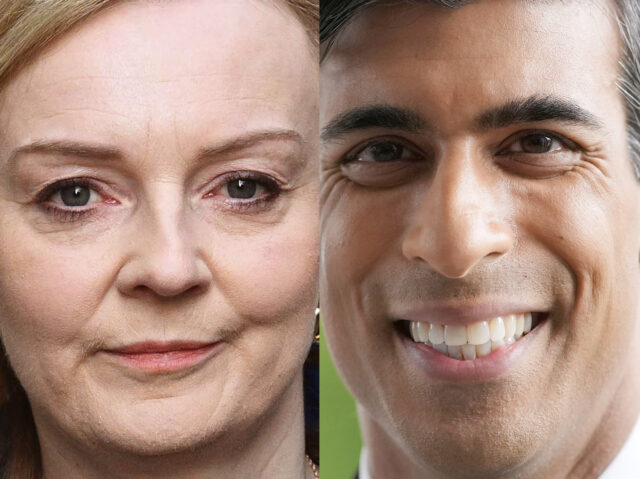Rishi Sunak, the tax-hiking former Chancellor of Exchequer, and Liz Truss, the Remain-voting Foreign Secretary, are continuing to clash ahead of the vote deciding which of them will replace Boris Johnson.
The Tory MPs, one of whom will be elevated to Conservative Party leader after a ballot of all party members, while generally offering pretty similar visions of the world are portraying themselves as at odds over taxation. Sunak, who along with Johnson has increased the British tax burden to its heaviest in 70 years, opposes tax cuts as adding inflationary pressure, and Truss, who once helped George Osborne threaten the public with a “punishment budget” if they voted for Brexit, arguing that tax cuts are needed to avert a recession and spur growth.
Sunak claims he wants to cut taxes and will do so eventually — a claim some Conservative MPs have scoffed at, given his record — but he has confirmed this will not happen until at least the Autumn of 2023 if he becomes Prime Minister, trying to sell this unpopular stance to members as honest, responsible campaigning.
“Wouldn’t my life be easier if I just sat here and [said] ‘I’m going to do this lovely sounding thing and this lovely sounding thing’? But that wouldn’t be leadership,” he said in comments to LBC quoted by The Telegraph.
“I think it would damage trust, because part of rebuilding trust is for the Government and politicians to deliver the things that they say. And sitting here and promising you a bunch of things that I don’t think are right or deliverable would be wrong,” he added.
Truss, meanwhile, suggested that Sunak’s high-tax approach to so-called fiscal conservatism was just slavish adherence to a discredited status quo.
“We have had a consensus of the Treasury, of economists, with the Financial Times, with other outlets, peddling a particular type of economic policy for 20 years,” she told the Today programme on BBC Radio 4, per the left-wing Guardian newspaper.
“It hasn’t delivered growth. People are struggling with the cost of living: it is wrong to be increasing their taxes at a time when it is difficult for them to pay their bills,” she said, insisting that policies such as cutting fuel tax would “decrease inflation” by making prices lower.
It is true that what might be termed the economic establishment seems fixated on a certain way of doing things, with curbing inflation the overriding concern regardless of the impact on people’s lives.
Andrew Bailey, governor of Britain’s central bank, the Bank of England, said in February that it would be a good thing if workers chose not to ask for significant pay rises — despite the rising cost of living — to help fight inflation.
Bailey, who is himself paid a a base salary of £495,000 ($672,000) and significantly more including pension contributions, acknowledged that people would find this “painful” but said it would help the economy “get through this problem more quickly”.
Follow Jack Montgomery on Twitter: @JackBMontgomery
Follow Breitbart London on Facebook: Breitbart London

COMMENTS
Please let us know if you're having issues with commenting.